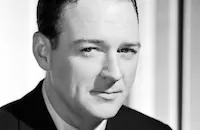The Mayor of 44th Street

Brief Synopsis
Cast & Crew
Alfred E. Green
George Murphy
Anne Shirley
William Gargan
Richard Barthelmess
Joan Merrill
Film Details
Technical Specs

Synopsis
Joe Jonathan, a New York dance-hall band promoter, is visted by vice detective Tommy Fallon, who warns him that his old boss, Ed Kirby, is about to be paroled. Kirby, who was nicknamed "The Mayor of 44th Street," controlled the clubs through extortion and fear. In contrast, Joe places bands according to their merit. Consequently, when Joe receives demands for protection money from Bitz McCard, he refuses to listen until Bitz sends his gang to disrupt one of Joe's clubs. Joe is surprised to discover that Bitz's troops are composed of tough-talking kids and even more surprised when he meets Bitz, a teenager. Seeing himself in the precocious Bitz, Joe offers him a job as his assistant but warns him that he must leave his gang behind. Joe's offer upsets Jessie Lee, his former dance partner and present assistant and girl friend, who calls Bitz a "midget gangster." Jessie is even more disturbed when Joe takes Bitz under his wing and invites him to move into his penthouse. Soon after, Kirby's attorney visits Joe and tells him that his client has decided to go straight and needs a job. When Joe agrees to hire Kirby, Jessie decides to look for a new dance partner and warns Joe that Kirby is a born racketeer. Jessie's assessment proves accurate when Kirby appears at Joe's office and announces that he plans to take over. In response, Joe cautions Kirby that his business is legitimate and he intends to keep it that way. When Joe leaves for San Francisco on a business trip, Kirby begins to undermine him by offering bandleader Lew Luddy a booking at the Hamilton Club in exchange for a kick-back. Next, Kirby recruits Bitz and his gang to disrupt the club until the management agrees to hire Luddy. As Kirby begins to monopolize the ballroom scene, Jessie sends for Joe, who returns to New York and fires Kirby. Bitz, who has left Joe to work for Kirby, soon becomes disturbed by Kirby's destructive methods. After Kirby bombs the Latham Club, Tommy closes down all of Joe's clubs. Joe then goes to confront Kirby, but when Kirby orders his men to attack Joe, Bitz calls his kids in Joe's defense. When the police, who have been summoned by Jessie, arrive at Kirby's headquarters, they find Kirby's gang hanging from the rafters, having been subdued by Bitz and his gang. With peace restored to the ballroom business, Joe and Jessie get married and Bitz returns to work for Joe.

Director
Alfred E. Green
Cast

George Murphy

Anne Shirley

William Gargan

Richard Barthelmess
Joan Merrill
Freddy Martin
Rex Downing

Millard Mitchell

Mary Wickes
Eddie Hart
Roberta Smith
Marten Lamont
Monty Collins
Lee Bonnell

Walter Reed
Pete Theodore
Jack Byron
Jane Patten
Gerald Pierce
David Kirkland
Rosemary Coleman
Wayne Mccoy

Richard Martin
Linda Rivas
Jane Woodworth
John Maguire
Reginald Barlow
Lee Frederick
Jack Gardner
Clarence Hennecke
Johnny Tryon
James Mena
Matt Moore
Ken Christy
George Ford
Lola Jensen
Norman Mayes
Barbara Clark
Donald Kerr
Mike Lally
Frank O'connor
Crew
Robert D. Andrews
C. Bakaleinikoff
Wesley Barry
Clem Beauchamp
John L. Cass
Nick Castle
Albert S. D'agostino
Lewis R. Foster
Robert De Grasse
Feild M. Gray
Mort Greene
J. R. Mcdonough
Irene Morra
Cliff Reid
Renie
Harry Revel
Frank Ryan

Film Details
Technical Specs

Award Nominations
Best Song
Quotes
Trivia
Notes
According to pre-production news items in Hollywood Reporter and Los Angeles Times, RKO paid $20,000 for Luther Davis and John Cleveland's factual Collier's article and the studio initially considered Jackie Cooper for the role of "Bitz" and Ray Collins, George Raft and Brian Donlevy for other parts in the film. A news item in Hollywood Reporter notes that the studio was so impressed by Joan Merrill's test for this film that they ordered her part enlarged to a second female lead. According to other news items in Hollywood Reporter, this film marked the promotion of assistant director Clem Beauchamp from shorts to feature length films. The picture also marked the return of art director Feild Gray to RKO after a five-year stint as set decorator at M-G-M. George Murphy was borrowed from M-G-M to star in this film. The song "There's a Breeze on Lake Louise" was nominated for an Academy Award for Best Song.












